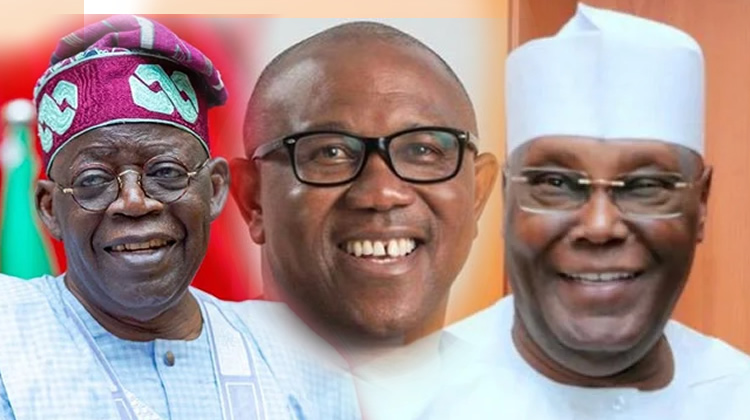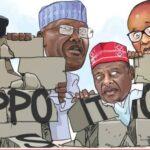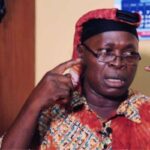“When Nigerians find themselves in a free environment, they talk in such a manner that you will take them as champions, like they can wrestle the lion with their bare hands… When he (Lai Mohammed) was taken to the office, he was totally disoriented because of fear and could not even utter a word.”
Those were the words of Marilyn Ogar, then spokesperson of the Department of State Services (DSS) while reacting to the arrest of Mr Lai Mohammed—the then National Publicity Secretary of the All Progressives Congress (APC)—on the eve of the 2014 Osun governorship election.
In Nigeria’s democratic sojourn, Mohammed, who goes into history as the longest serving spokesperson of an opposition party, has a pride of place. He kept the ruling party on its toes. As a matter of fact, some of the things he said as APC/ACN spokesman caught up with him when he spent eight years as minister under former President Muhammadu Buhari.
Buhari himself deepened democracy as a leading opposition figure, who contested election four times before succeeding. He was the toughest challenger of the Peoples Democratic Party (PDP).
Police to establish full drone system to aid security – IGP
We can accomplish more when we shelve partisan politics — Tinubu
Aside from 1999, when democracy returned, Buhari presented himself each election year, coming second with millions of votes in his kitty on all of those three spells. When those huge votes didn’t fetch the desired result, he entered into an alliance with Bola Ahmed Tinubu and the 16-year dominance of the PDP ended.
The history of opposition in Nigeria’s 25-year unbeaten democratic run is incomplete without the Occupy Nigeria protest, which Tinubu was alleged to have sponsored. An anti-subsidy removal campaign, the movement was later propagated to unseat ex-President Goodluck Jonathan. The agitation was also one of the corridors through which the ruling APC emerged. Asiwaju or Jagaban as fondly called by his followers played a key role in the formation of the APC in 2013. Ten years later, he rode on that platform to the highest office in the land.
In an article titled, “Removal of oil subsidy – President Jonathan breaks social contract with the people,” Tinubu criticised the then federal government over what he described as the “Jonathan tax”.
“I am not calling President Jonathan an evil man. I do not believe he is perverse. However, the economic ideas controlling him are so misguided that they have a perverse impact. Because he is a slave to wrong-headed economics, the people will become enslaved to greater misery. The people now pay a steep tax for voting him into office. The removal of the subsidy is the “Jonathan tax.” This situation shows that ideas count more than personalities. People may occupy office but how that person performs depends on the ideas that occupy his mind,” Tinubu said.
Tinubu, also, at different times held past leaders’ feet to fire on insecurity, economy and political issues. As the leader of the opposition for more than 16 years, he was a pain in the butt of successive Nigerian leaders, forcing them into actions through constant scratchy criticism and engagement. He constantly mobilised other opposition leaders, civil society leaders, human rights activists and lawyers to push his narrative forward.
Tinubu’s rise to power on May 29, 2023, has thrown up argument among pundits as to whether or not opposition parties can make a difference under his presidency. He was a master of his game as a kingmaker of Lagos, where the opposition was next to nothing in terms of strength and this fuelled his dominance.
At the birth of democracy in 1999, Tinubu won by a wide margin as a member of the Alliance for Democracy (AD) in the first post-transition Lagos gubernatorial election. AD also won in other states in South west, but four years later, only Tinubu survived former President Olusegun Obasanjo’s onslaught on the region.
Upon completion of two-term in office in 2007, Tinubu had emerged a colossus as he not only handpicked his successors, he extended his political base and played huge roles in enthroning governors — Ibikunle Amosun (Ogun), Rauf Aregbesola (Osun), Abiola Ajimobi (Oyo), Kayode Fayemi (Ekiti), Olusegun Mimiko (Ondo) and Adams Oshiomhole (Edo).
Atiku, Obi, as leaders of opposition
After the 2023 elections, the second-placed candidate, Atiku Abubakar of PDP, joined third-placed Peter Obi, who ran under Labour Party, to challenge the result in court.
Atiku described the result as “a rape of democracy”, while Obi told his supporters they had been “robbed”. However, Atiku and Obi lost the legal battle. The duo appear to be the face of the opposition under Tinubu’s administration. But how active they have played this role evokes more questions than answers.
Nevertheless, it is worthy to note that the opposition leaders have been holding Tinubu to account over economic and security issues. Both Atiku and Obi at different times castigated Tinubu over the rising hardship created by floating of the naira, subsidy removal and widespread kidnap and other criminal activities.
But barely one year after the last presidential election, the two major opposition platforms have been embroiled in multi-faced crises which appear to be boosting the chance and capacity of the ruling party.
For LP, trouble started for the party soon after the 2023 general elections when some members under the leadership of Alhaji Lamidi Apapa and Abayomi Arabambi accused the national chairman, Julius Abure, of misappropriation of funds.
The Abure-Apapa feud went from courts to some states of the federation, with accusations and counter accusations on who had the genuine interest of the party at heart and who was its genuine leader.
In PDP, the crisis of ego is tearing the party apart. The PDP has been embroiled in an internal conflict since the emergence of Atiku as the party’s flag bearer.
Funny enough, Nyesom Wike, who led the G-5 governors that shattered Atiku’s hope of the presidency, is very much active in both the ruling party and the opposition. Atiku’s foot soldiers had looked forward to the 98th National Executive Caucus meeting of the PDP to dislodge Wike and his structure, but they got a shocker as the politician who accepted a ministerial offer from an APC government emerged from the meeting stronger. Not only did the plot to remove Ambassador Iliya Damagum as acting PDP chairman fell like a pack of cards, discussions on suspending Wike for anti-party activities were avoided by the PDP to deepen reconciliatory efforts.
In a post-NEC review meeting, Atiku, a former vice president who had contested six different times to become Nigeria’s president but failed, told his supporters that “It is God that gives power, not anybody.” His reaction followed discussions that his camp did not get the desired outcome from NEC and the danger Wike poses to his bid to pick the 2027 presidential ticket.
Aside from the PDP and LP, the New Nigeria’s Peoples Party (NNPP) which emerged as another force in the last election, has been plunged into crisis.
Nigeria sliding into one party state
A Professor of Political Science, Emmanuel Ojo, said Nigeria does not have a virile opposition under Tinubu’s presidency.
Ojo, who was Chief of Staff to late Governor Abiola Ajimobi, said, “Almost one year of Tinubu presidency, we have not been able to have virile opposition, the ruling party has been behaving in a way that Nigeria looks more like a one-party state than a multiparty state.
“The interesting part of it is that Tinubu is an experienced politician; he was a leader of opposition, so he knew ab initio how to handle opposition elements and he seems to be doing that very well.
“Don’t forget that the so-called opposition elements and the likes of Tinubu and other human rights leaders, it has been difficult for human rights leaders to rise up against his government, he knows how to handle them, he has been handling them.
“If it were to be another government that withdrew fuel subsidy just like that, the whole country would have been involved in crisis. When Jonathan removed subsidy by small margin, it was the likes of Fashola and all these people in Lagos State that were protesting, so what has happened now? Nigerians are under serious pain and agony and there is nobody to rescue them.”
As things stand, the big test for Nigeria’s democracy is getting the opposition to stand up to the ruling party in the interest of good governance. Anything short of this would make the incumbent number one citizen a conqueror of sort as he reigned as an opposition leader and is currently having a smooth ride on the seat of power, irrespective of glaring loopholes.

 Join Daily Trust WhatsApp Community For Quick Access To News and Happenings Around You.
Join Daily Trust WhatsApp Community For Quick Access To News and Happenings Around You.

